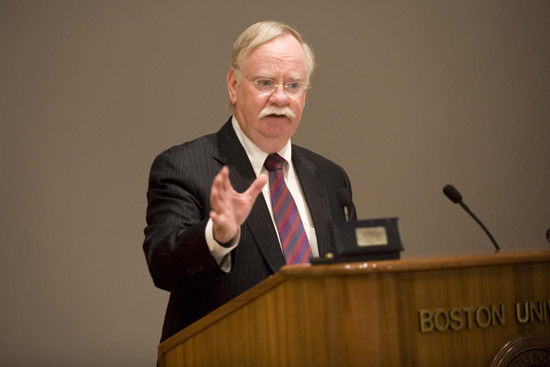Brown Joins in Call to Save Research Funding
Cosigns letter to congressional leaders ahead of "fiscal cliff"

BU President Robert A. Brown is among 16 Massachusetts research university and hospital leaders urging the state’s congressional delegation to save federal funding for research. Photo by Kalman Zabarsky
The automatic federal spending cuts that are scheduled for January 2 imperil vital academic research. That’s the message BU President Robert A. Brown and peers at 15 Massachusetts research universities and hospitals have sent to the state’s congressional delegation.
“These across-the-board cuts will drastically reduce the federal research funding that we depend on to deliver innovations essential to economic growth,” the group wrote in a letter dated today to Bay State congressmen and senators. “Support for federal research funding helps to ensure our nation’s health, prosperity, and international competitiveness. It has never been more important.”
The budget cuts—“sequestration” in Washington-speak—were passed last year, in case they were needed, as an alternative to a bipartisan deficit agreement. And since a special committee assigned to find $1 trillion in cuts over the next decade couldn’t reach consensus, they were needed. Republicans on the committee refused to consider tax increases in tandem with spending cuts. Economists fear that the double whammy will cripple an economy only slowly coming out of recession.
The letter says that research subsidies from an array of agencies—the National Institutes of Health, the Defense and Energy Departments, the National Science Foundation, and NASA—have been “catalyzing discovery and entrepreneurship. The federal dollars we receive have a return far beyond their initial investment, acting as a significant magnet for private sector dollars that spur job creation in Massachusetts and beyond.”
Jean Morrison, university provost and chief academic officer, urges all citizens to speak out against the cuts. “The letter that President Brown and the leaders of Massachusetts academic and medical institutions have sent to our congressional leadership in Washington makes a clear case about the need to avoid sequestration,” says Morrison. “There are many essential activities and services in Massachusetts funded by the federal government, through a variety of agencies, that have profound and widespread impact on a great number of people. If sequestration were implemented, the negative effects would be immediate and devastating. The letter makes an excellent case, but we should all—as individuals and citizens—contact our representatives, as well, and express the importance of reaching resolution and solving this challenge.”
Muhammad Zaman, a College of Engineering associate professor of biomedical engineering, fears that the across-the-board cuts would slow progress on potentially lifesaving research such as an investigation in his lab of the metastasis of cancer cells. “Most biomedical research, including mine, is supported by federal grants from the NSF and NIH,” says Zaman. “In particular, our work on finding fundamental processes regulating cancer is funded by the NIH. Automatic budget cuts would threaten the continuation of this work that is aimed at elucidating the fundamental basis of cancer metastasis, a problem that affects millions of Americans every year. Industry rarely supports these kinds of fundamental and long-range studies. Automatic cuts would stop my lab from these pursuits, which will not only affect our research, student recruitment, and research fellow jobs in the short term, but in the long term our understanding of new and evolving cancers will be poorer without these models.”
The letter cites the $2.4 billion Massachusetts received for medical research in fiscal year 2011—“second only to California”—which, the leaders say, leveraged almost $1.1 billion from venture capital firms to biotechnology companies. Those companies created more than 3,500 jobs in Massachusetts between 2004 and 2011, “more than any other state in this area over the same period,” they wrote.
The “fiscal cliff” of $110 billion in spending cuts, coupled with the expiration of Bush-era tax cuts, also has alarmed the Obama administration, which issued 394 pages in September that outlined the hits across the federal budget.
The letter argues that “federal research and development has not been a driving force behind our deficits.
“Overall spending, at both defense and non-defense agencies, has been essentially flat in constant dollars since 2003, and despite its critical role in economic growth, federal research and development as a percent of GDP has fallen by half since 1965.
“Considering the consequential decision at hand, we hope you will work together with your colleagues to adopt balanced deficit reduction strategies that view investments in research as part of the budget solution rather than simply as an expenditure.”
Cosigning the letter, which also is being sent to local and national media, with Brown were the presidents and chief officers of Harvard, Northeastern, MIT, Tufts, the University of Massachusetts, Beth Israel Deaconess Medical Center, Brigham and Women’s Hospital, Massachusetts General Hospital, Boston Medical Center, Tufts Medical Center, Boston Children’s Hospital, Dana-Farber Cancer Institute, Joslin Diabetes Center, McLean Hospital, and the Massachusetts Eye and Ear Infirmary.

Comments & Discussion
Boston University moderates comments to facilitate an informed, substantive, civil conversation. Abusive, profane, self-promotional, misleading, incoherent or off-topic comments will be rejected. Moderators are staffed during regular business hours (EST) and can only accept comments written in English. Statistics or facts must include a citation or a link to the citation.